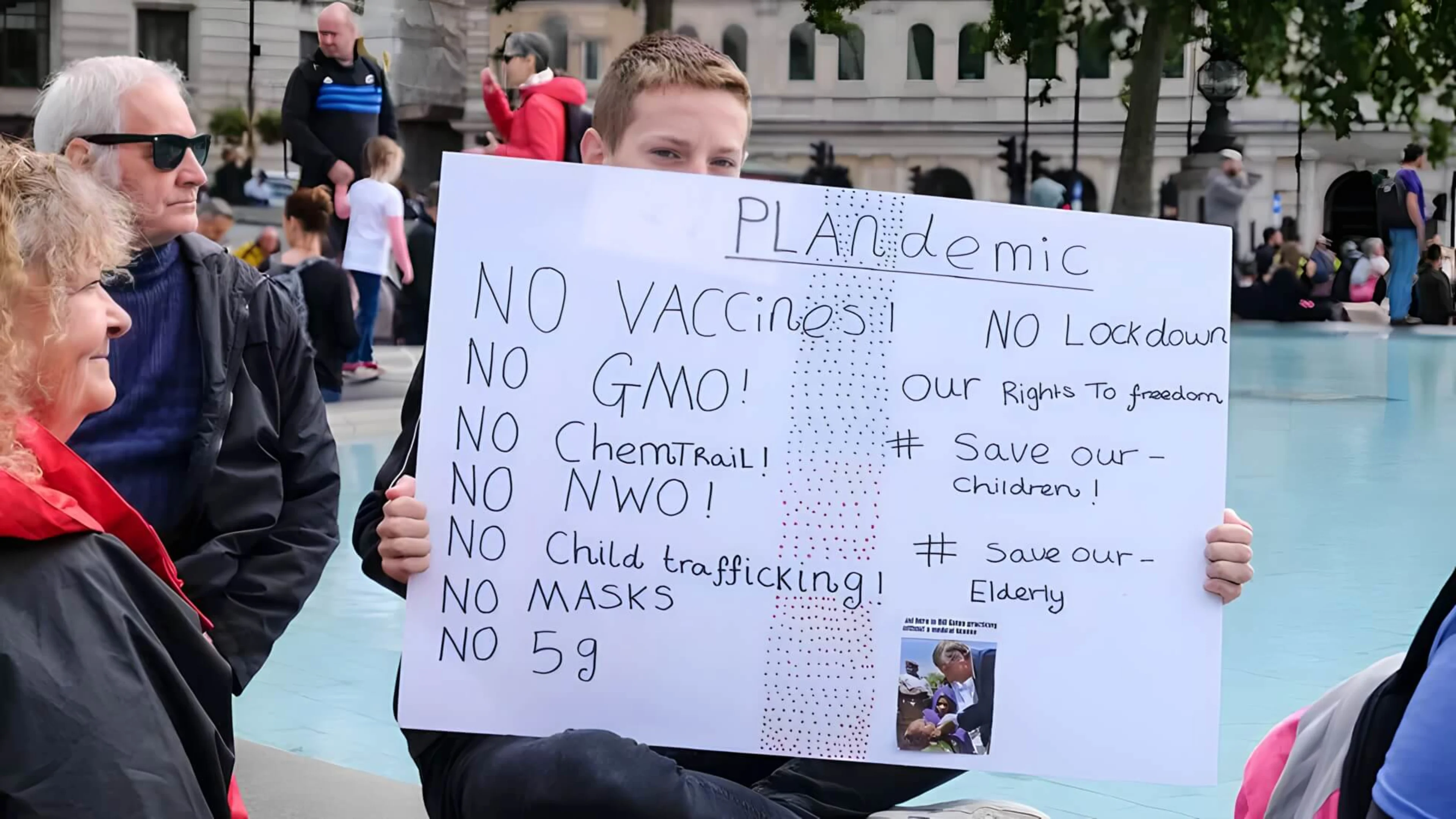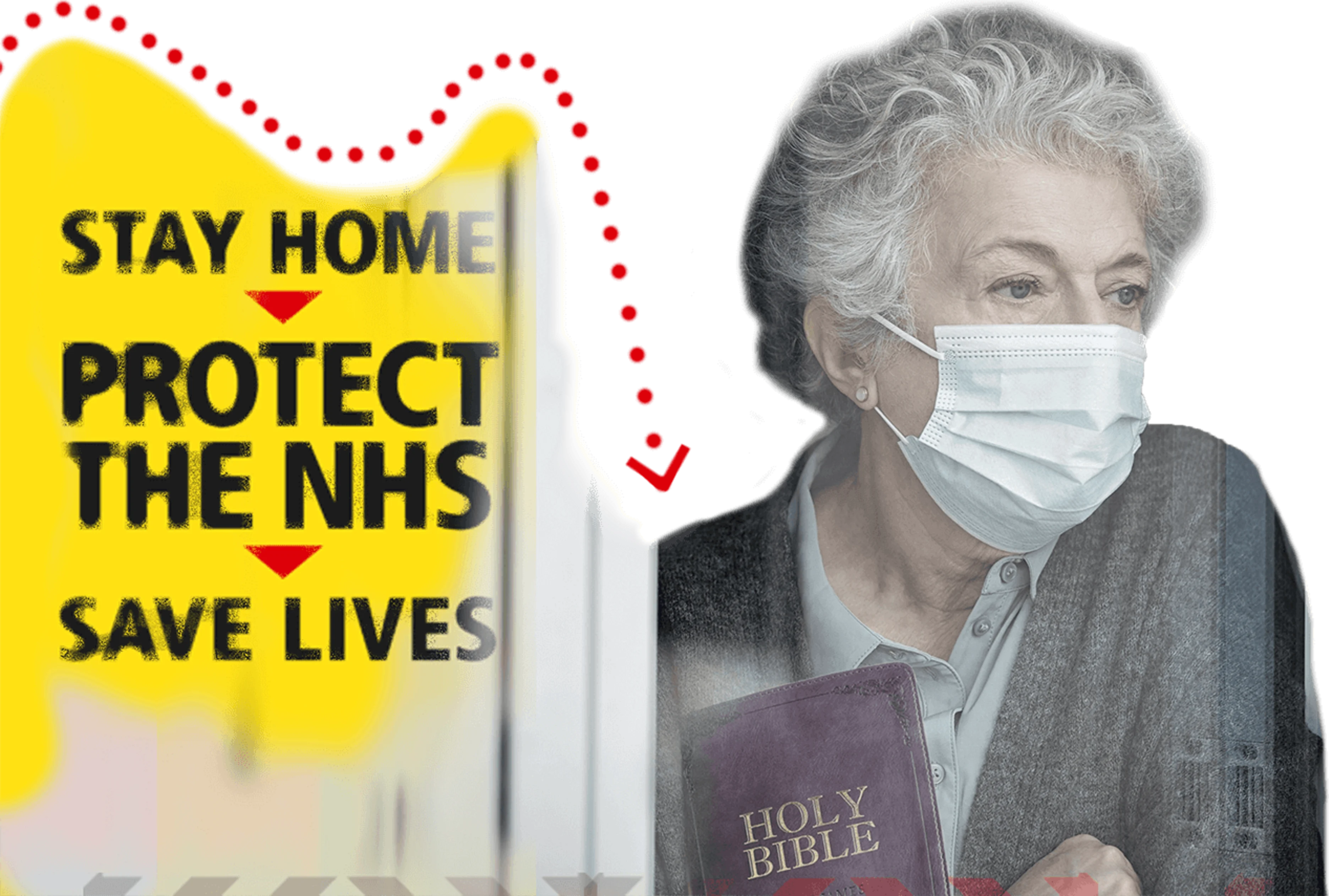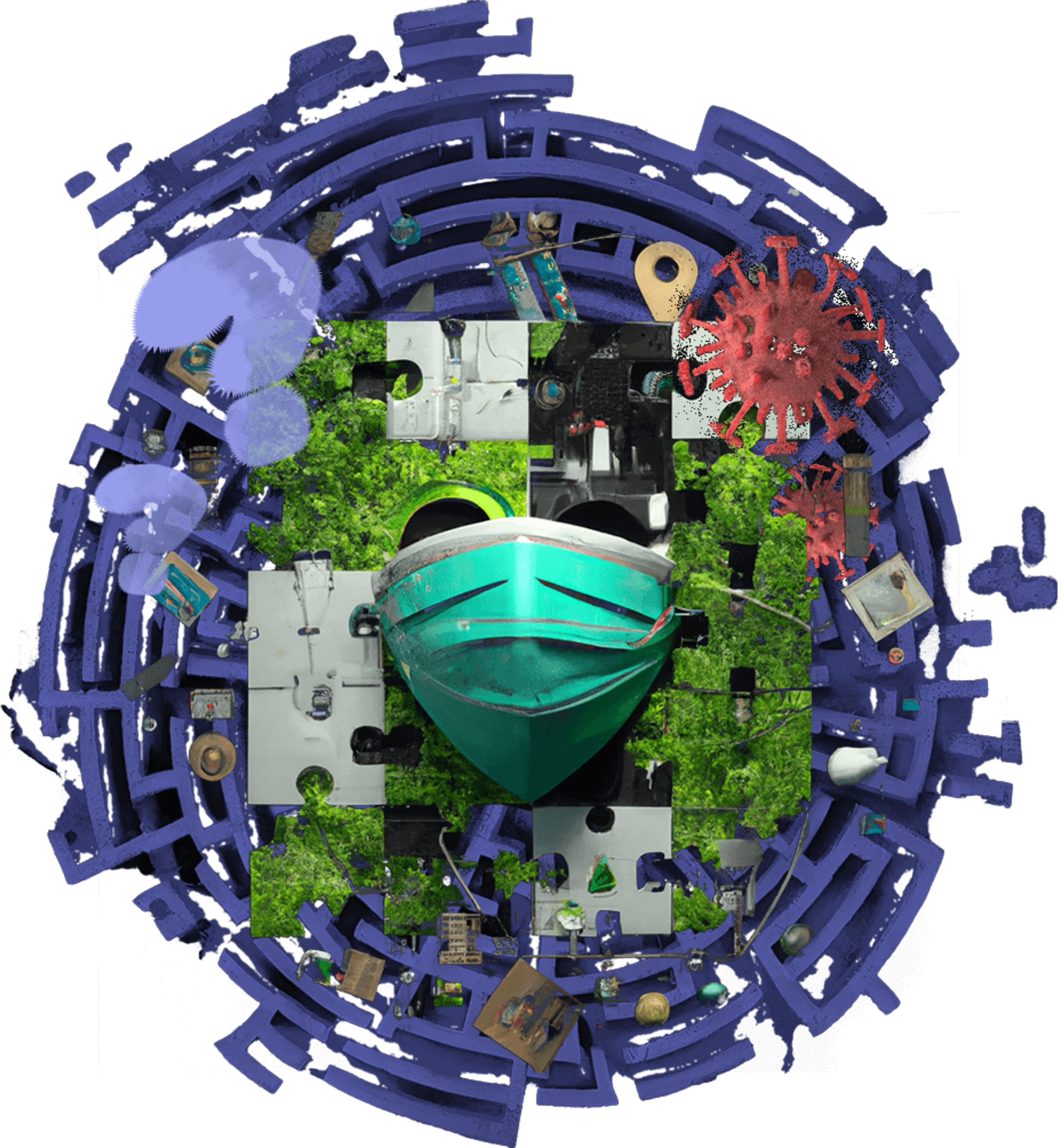It’s February in Oxford, and thousands of protestors have descended on the city. The streets are packed with placards stretching as far as the eye can see. Ostensibly, the protest is about the introduction of low-traffic neighbourhoods (LTNs). But the words on those placards tell a different story — one that is much more complex. “Governments are lying to you,” says one, ambiguously. “Say NO to the new world order” shouts another. A third sign, accompanied by an image of intense, watchful eyes, declares: “The 15-minute WEF ghettos are not about climate, it’s tyrannical control!”
It isn’t just concerned residents who have turned up at this protest. It’s also a gathering of the disaffected and the sceptical. Stripped of all trust following the government’s shady decision-making during the pandemic, hundreds of people have turned to alternative online theories to make sense of what is happening in the world. Theories that create links between seemingly disparate ideas, from 5G and vaccines to 15-minute cities, low-traffic neighbourhoods and digital currencies.
A basic overview of the narrative goes something like this: a cabal of elites (most notably the WEF) is orchestrating global events to control the populace through Agenda 21 (now Agenda 30), an action plan of sustainable development goals set out by the United Nations, and The Great Reset, which is the WEF’s post-COVID economic recovery plan. Thus, COVID lockdowns paved the way for future climate lockdowns, which are being soft-launched using fifteen-minute cities… or so the story goes.

Whether or not you put any stock in this theory, one thing is clear: the global pandemic created fertile ground for an overarching conspiracy narrative in which technological and scientific developments and restrictive climate policies become control mechanisms.
Prior to the pandemic, my friends would jokingly make references to 9/11 being an inside job or that the royals were responsible for Diana’s car crash. These were passing comments, bits of humour that nobody I knew took seriously. That’s what conspiracy theories were, at the time: ideas that only a tiny minority of people believed. Now it’s hard to escape them. So how exactly did we end up here?
The single biggest reason for the explosion of conspiracy theories is the government’s lack of transparency during the pandemic. It isn’t just that an unprecedented event took place; people needed a way to make sense of it. COVID authoritarianism and the systematic suppression of alternative viewpoints played into pre-existing anxieties, giving credence to ideas that most people would ordinarily have dismissed.
The World Health Organisation aptly deemed misinformation about COVID an “infodemic”. However, in its eyes and the eyes of the UK government at the time, misinformation was anything that didn’t fit the official narrative. Because it was, at the end of the day, a narrative people were being fed. Switch on your television, and you’d see a rolling death toll, not of people who had died of the virus, but of those who died with it — a distinction that the BBC and other news outlets often saw fit to gloss over, even though doing so resulted in a skewed understanding of the severity of the virus.
To many, the deliberate ramping up of fear during COVID was a betrayal. More than that, it led them to question: ‘Why?’ Why did Matt Hancock intend to “frighten the pants off [sic] everyone”, as we saw in his leaked WhatsApp messages? Why was the phrase ‘follow the science’ manipulated so it could be deployed at any given opportunity to shut down questions when science is supposed to be about speculation: testing and re-testing a hypothesis, following the evidence and fostering debate rather than creating an echo chamber?
Matt Hancock
We frighten the pants of everyone with the new strain
11:17
but the complication with that Brexit is taking the top line
11:17
Damon Poole
Yep that's what will get proper bahviour change
11:17
Matt Hancock
When do we deploy the new variant
11:35
The Great Barrington Declaration is a prime example; most signatories were reputable scientists who argued against lockdown, proposing to shield the vulnerable instead. Had they been taken seriously, we might not now be facing the dire consequences of spending two and a half years trapped at home: a struggling economy, children years behind in their education, and record levels of mental illness. Currently, twice as many claims are made each day for sickness benefits in the UK than before the pandemic, and mental health is one of the biggest causes.
The problem is that the data was there all along: we knew very early that the virus predominantly affected those aged 80+ and was unlikely to cause serious illness in otherwise healthy young and middle-aged people. As is now the norm in Tory Britain, the young had to make sacrifices for the old. A startling number of people are languishing on NHS waiting lists as a result — how many will die before they are treated? Did the benefits outweigh the costs? These are the questions few in power asked at the time, but many people at home were thinking about them every day, looking for answers the government couldn’t — or wouldn’t — provide. In the absence of official explanations, some turned to conspiracy theories, fuelled by anger and betrayal.
It is alarming that the UK, a largely liberal society, fell so quickly into authoritarianism. Neighbours reported each other for minor rule breaches, and human beings were treated like walking biohazards. Thousands of pounds in fines were doled out, even though it later emerged that the politicians calling the shots were flagrantly breaking their own rules. At one point, we were permitted one outdoor exercise session a day. It sounds ludicrous because it was. In fact, it sounds like a remaking of Orwell’s Nineteen Eighty-Four, as conspiracy theorists are keen to point out. By reacting to COVID in a previously unimaginable way, the government created the ideal environment for conspiracies: one fuelled by fear, mistrust and betrayal.
Paradoxically, while many conspiracy theories are rooted in the notion of a ruling elite dictating the lives of ordinary people, believing in them is itself an act of control. Never were people less in control of their own lives than during COVID. However, feelings of helplessness have been building for a while now.
It’s no secret that life in the UK is getting worse. We’re poorer, and nothing seems to work; meanwhile, the richest in society are getting richer. This is the kernel of truth at the heart of the most prevalent conspiracies circulating today, and it’s part of the reason that the green agenda has become embroiled in so much controversy.
Since even before 2020, various green policies were implemented — like lockdowns — with no public vote. The 2030 ban on combustion engines is one example; more recently, Oxfordshire County Council’s fifteen-minute city plans and Sadiq Khan’s Ultra-Low Emission Zone have been introduced. We need to act to prevent climate change, but these policies are rarely accompanied by a cost-benefit analysis which takes into account the lives and livelihoods of ordinary people.

Those who buy into conspiracy theories often do so because they feel like their lives are being impacted by policies over which they have little to no say. They feel the world shrinking around them, their possibilities threatened by the demonisation of cars, planes and gas boilers. Policies legislating against the use of such things might not meet so much resistance if they had been thought through or set in an achievable timeframe — if electric cars were affordable and we had the technology to store energy at a large capacity when the wind doesn’t blow, for example.
The UK’s impressive progress in cutting emissions, which has seen a 20% reduction since 2010, is rarely discussed. Our successes are hardly ever highlighted; instead, the narrative is one of alarmism. Which leads people, again, to ask: why? There is a communication gap which the government has thus far failed to address. A greater level of consultation and debate is required; ordinary people need to feel empowered.
One lady wrote on Facebook,
“I have a really simple litmus test for #15minutecities: What do they install first, new play parks, better transport and up to date amenities… or the cameras, barriers and restriction technology? There’s your answer as to what purpose they serve.”
She has a point; imposing traffic restrictions before upgrading infrastructure looks bad, but it’s typical of the government’s approach to environmental issues. Targets and guidelines are set before we know if we can achieve them and rarely are the potentially negative impacts on the lives of ordinary people considered.
Ultimately, when people feel they lack agency in their own lives, resentment grows. Memories of the swift shift to authoritarianism during COVID will linger for many years. Pandora’s box has been opened, revealing the ugly truth: “That would never happen in our country” is something we can no longer say truthfully. The COVID inquiry looks set to gloss over the key question it should answer, which is whether our response was proportional, and it is doubtful whether politicians who acted immorally will be held accountable in a meaningful way.
The government hasn’t done enough to address the mistakes it made during the pandemic — that is at least partly why it is now seeing so much resistance to green policies, which also have the potential to restrict personal freedom, albeit in a much less severe way. Conspiracy theories will continue to proliferate unless people’s concerns are addressed and they feel listened to, not mocked and derided.
Written by
Ellie Dyer-BrownCreative Writing MA student at Durham University and freelance writer interested in all things controversial.
Read next
Lockdown: When "Love Thy Neighbour" meant dying alone

Laura Calnan
Why my generation is going insane: the impact of COVID on mental health

Matt Donno
I'm fed up with 'Forever'. Where's our Übermensch?

Sion Marsh
Weekly emails
Get more from Ellie
The Fledger was born out of a deep-seated belief in the power of young voices. Get relevant views on topics you care about direct to your inbox each week.
Write at The Fledger
Disagree with Ellie?
Have an article in mind? The Fledger is open to voices from all backgrounds. Get in touch and give your words flight.
Write the Contrast

